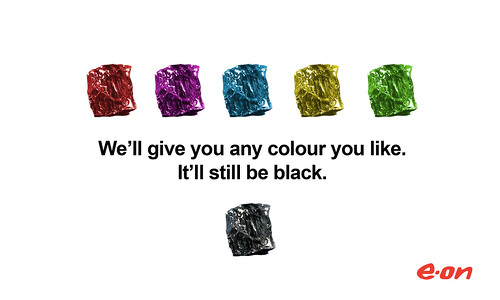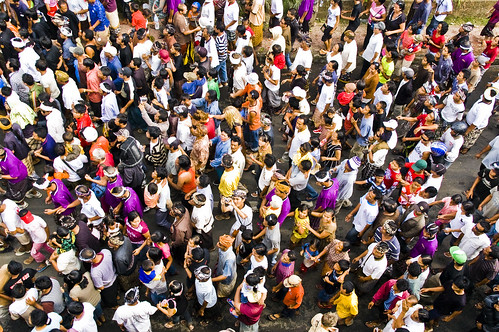Developing new cleaner technologies for refining and burning coal seems like a step in the right direction, but really it's just a way of holding on to something that must pass. The real problem starts with coal mining. I've personally seen strip mines, where layers of soil are stripped from the Earth to get to the coal. It leaves a lifeless hole. Mountaintop mining involves the blasting off of entire mountaintops to get to coal. The environmental effects are devastating, but in many areas people depend on mining jobs and will fight very hard to keep these practices going. (This is why offering comparable jobs in renewable energy is absolutely imperative.)
Clean coal relies heavily on some thing called carbon sequestration, which is storing carbon dioxide in geologic formations. The truth is that nobody on Earth knows how this will actually work on a large scale and a long time frame (especially in terms of geologic time where nothing is really staying put). And nobody has a clue how to pay for such a massive undertaking.
CO2 emissions are not the biggest waste product from using coal. Massive amounts of coal ash is produced. Currently, the dumping of coal ash is not regulated. We're talking about tons of solid waste that contains toxins, like mercury, which is known to be devastating to humans, the younger the human the more devastating the effects.
Most inhabited planets don't have the massive fossil fuel resources that Earth does. Other planets developed without fossil fuels. You can do it on Earth too. It just requires a shift in attitude.
*Watch your elected officials. Let them know it's not okay to give greater support to coal than to renewable energy.
*When clean coal comes up in your local news, write a letter to the editor.
*As always, use energy wisely. The less electricity you use, the less coal needs to be mined, processed, and burned.
To learn more read TIME magazine.
Sunday, October 31, 2010
Thursday, October 28, 2010
Why monocropping is stupid
Nature tends to favor diversity. Without very serious human intervention, you would never see acres of corn or soybeans. By human standards, more is better. At least most people seem to think so. What if nature had the better idea all along?
In a University of Wisconsin study, organic farming involving planting multiple crops in a given area to ward off pests is actually more profitable than monocropping. One of the big problems with monocropping is that food is then transported hundreds or even thousands of miles overseas. In most developing nations, the people who grow the food can't afford to buy it. An even bigger problem is all the chemicals needed to sustain a monocrop. There are fertilizers to enhance depleted soil (at least temporarily), pesticides to keep insects away, and herbicides to prevent weeds. All these chemicals are very dangerous to human health (it's just a matter of quantity and toxic chemicals have a cumulative effect because they can stay in the body for many years.)
Why then are we doing it? Government subsidies have a lot to do with it. Corporate monopolies also are part of the problem, but it's not a big conspiracy. It's a habit people got into. Habits can be changed. It starts with an appreciation for where your food comes from.
What can you do?
*Grow a garden. If you don't have available space, check and see if your community has a community garden.
*Buy locally grown, organic foods when possible.
*Visit a local farmer's market. Better yet, visit a local farm.
*Choose to eat less processed food wherever possible.
In a University of Wisconsin study, organic farming involving planting multiple crops in a given area to ward off pests is actually more profitable than monocropping. One of the big problems with monocropping is that food is then transported hundreds or even thousands of miles overseas. In most developing nations, the people who grow the food can't afford to buy it. An even bigger problem is all the chemicals needed to sustain a monocrop. There are fertilizers to enhance depleted soil (at least temporarily), pesticides to keep insects away, and herbicides to prevent weeds. All these chemicals are very dangerous to human health (it's just a matter of quantity and toxic chemicals have a cumulative effect because they can stay in the body for many years.)
Why then are we doing it? Government subsidies have a lot to do with it. Corporate monopolies also are part of the problem, but it's not a big conspiracy. It's a habit people got into. Habits can be changed. It starts with an appreciation for where your food comes from.
What can you do?
*Grow a garden. If you don't have available space, check and see if your community has a community garden.
*Buy locally grown, organic foods when possible.
*Visit a local farmer's market. Better yet, visit a local farm.
*Choose to eat less processed food wherever possible.
Wednesday, October 27, 2010
Greetings From Planet Erith
Hi, I'm Freiya. I'm from a planet called Erith. It's in another solar system not too far from your Earth, but far enough that you haven't seen it yet. I'm doing this blog because I want to see you protect planet Earth. It seems like an impossible task, but I truly believe that with a little care the Earth can sustain a large population, and everyone on Earth can have food, clean water, and shelter.
First, I should tell you my planet's story. A long time ago, before we learned the ways of other planets, we had the richest soil possible. We could grow anything. There was such an abundance of plants and wildlife that we had more food than we could ever eat with little effort. Then we met people from other planets who promised us things we didn't know we wanted, but we wanted it. We sold a little land to grow some very rare species that go for lots of money on the intergalactic market. Unfortunately, those plants didn't stay in the designated area. Within a few years, our crops were nearly completely decimated. Many species of animals died out because of lack of food.
Now,we are dependent on food aid from other planets. With few resources it is difficult to recover from the planet wide devastation of our food supplies. Many of my people live on spaceships. No planet will take them in. I'm lucky. I'm living on Earth on a science visa. If you saw me, you wouldn't notice me. You'd be surprised how many extraterrestrials could walk around unnoticed.
Please feel free to comment here or ask any question about planet Earth. If I don't know the answer, I'll do my best to find out. I'm with you and your planet!
First, I should tell you my planet's story. A long time ago, before we learned the ways of other planets, we had the richest soil possible. We could grow anything. There was such an abundance of plants and wildlife that we had more food than we could ever eat with little effort. Then we met people from other planets who promised us things we didn't know we wanted, but we wanted it. We sold a little land to grow some very rare species that go for lots of money on the intergalactic market. Unfortunately, those plants didn't stay in the designated area. Within a few years, our crops were nearly completely decimated. Many species of animals died out because of lack of food.
Now,we are dependent on food aid from other planets. With few resources it is difficult to recover from the planet wide devastation of our food supplies. Many of my people live on spaceships. No planet will take them in. I'm lucky. I'm living on Earth on a science visa. If you saw me, you wouldn't notice me. You'd be surprised how many extraterrestrials could walk around unnoticed.
Please feel free to comment here or ask any question about planet Earth. If I don't know the answer, I'll do my best to find out. I'm with you and your planet!
Subscribe to:
Posts (Atom)




